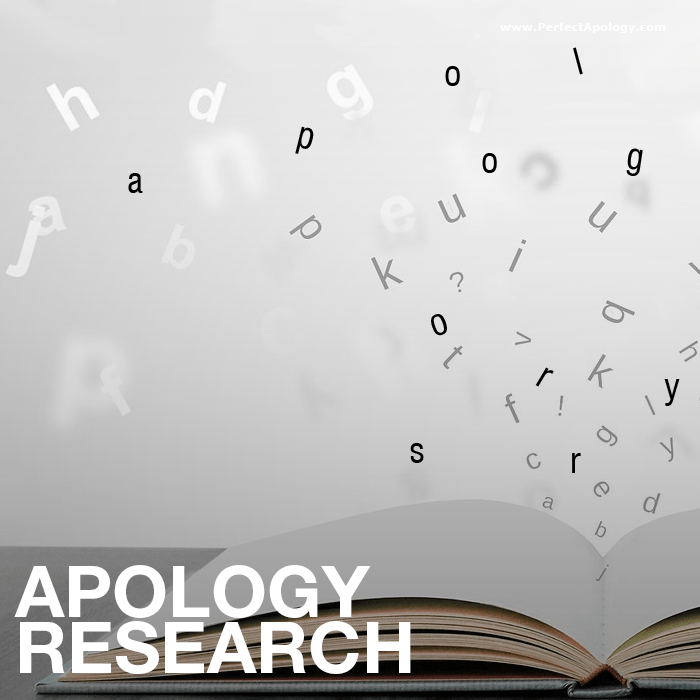Apology Research & Business Case Studies
In our relentless pursuit to uncover everything there is to know on the Art and Science of perfect apologies, our apology research is focused on providing credible findings and case studies.

We'll discuss and summarize the findings from any relevant study compiled by psychologists, sociologists or public relations experts and provide our thoughts on what readers should (and should not) take away from the research.
In Business Half an Apology is Worse than No Apology
Apparently, common sense and intuition are not sufficient guideposts when crafting the perfect apology. Common sense dictates, for example, that any apology is better than none at all. Research suggests otherwise.
In an INC. Magazine article, Allison Stein Wellner reviews some of the more fascinating insights gained from research on business apologies; insights that challenge the commonly held myth that something is better than nothing.
Wellner cites research by Jennifer K. Robbennolt (University Illinois) on the reactions of 145 professionals to situations involving some form of apology, typically in the context of considering a legal settlement after an accident.
According to Robbennolt's research, apologies that follow most if not all of the parts of an apology we outline were much more likely to lead to settlements (73 percent of the cases), but only 35 percent of respondents were willing to settle when only a partial apology was received.
The most fascinating (and relevant) result from Robbenolt's study is that 52 percent of respondents were willing to settle without having received any apology—that is no apology at all.
The point here is that more of an apology is better than less, but not enough can sometimes be worse.
Obviously delivering the perfectly balanced apology is NOT that straightforward. The key, as Wellner points out, is for the wronged person to believe that the apologizer,
...has truly considered what he or she has done. Call it the suffering effect.
Timing an apology is also crucial,
...waiting too long can backfire, but showing that you've had a chance to reflect on your errors and feel guilty about them will likely make your apology fall on more receptive ears.
Sincerity is another important ingredient,
...If you really don't intend to change your behavior, you're better off skipping the apology. Save your credibility—and your apology—for a time when you really need it. And make sure you mean it.
These are not insignificant qualifiers, they represent additional tidbits of advice that when combined with other suggestions and research offered on this site (such as this one showing half an apology being better than no apology at all) will get you closer to crafting a more perfect apology in business.
Case Studies & Business Apology Research
In our business section, we focus on apologies in the business world by offering our own apology reviews of some of the best and worst business mea culpas ever delivered.
For example, a reporter at Network World asked us to review apology letters that were issued by senior executives after data breaches were discovered at their respective companies. We gave one of them a score of -3. Yes, that is a negative three.
Want to know more? You'll find the link to our reviews on the effectiveness of 10 different apologies at the bottom of the page.
In keeping with what Network World asked us to do, our research would not be complete without some of our own case studies of corporate and business apologies that made headlines and are notable for various reasons, as described in our analysis.
BP Oil Spill Apology
British Petroleum apologizes for the Gulf of Mexico spill of 2010.
Toyota Apology Case Study
Toyota apologizes for the recall of close to eight million vehicles.
The Fukushima Nuclear Plant
The nuclear plant crisis and the TEPCO apology.
The Domino's Pizza Apology
Executives apologize for the poor quality & bad taste of their pizza.
And from the Journal of Management we learn about the findings of a study on the value of a perfect business apology. It turns out that the value of a business apology can actually be measured.
We hope that these types of studies provide you with additional insight into the art of delivering the perfect apology.
By examining serious public cases we can better understand our own chances of being forgiven should we ever find ourselves in a similar situation.
The Lighter Side Of Apology Research
A study, this time out of the UK found that saying sorry is NOT that difficult for the British. According to their apology research, we're likely to say sorry approximately 1.9 million times in our lifetime and the 'S' word is used roughly 368 times every day in the UK.
The UK research was based on a sample of 1,100 respondents who identified the following three most common reasons for saying sorry:
→ when they claim to have no time to finish a conversation,
→ when apologizing for someone else, and
→ when asking someone to repeat themselves."Why 1,000 apologies is not nearly enough", Michael Howie, The Scotsman, 2006
From a survey of 7,950 Americans (commissioned by a jewelry company who found that a substantial portion of their sales came from people apologizing) we learn of a potential correlation between how often we apologize, our income level and/or marital status—data that would be relevant and incredibly valuable to a jewelry company looking to leverage that particular target market.
The 7,590 Americans were interviewed on a range of questions about apologizing.
Two of the more interesting findings were:
Married people extend apologies more readily, and almost twice as often as single and divorced people.
The more you earn, the more you apologize and vice-versa. The more you apologize, the more you earn.
So we asked our resident expert Peter F. Goolpacy to comment on the jewelry company's findings and perhaps offer some form of explanation.
![]()
Although he didn't have access to the survey questions and raw data for each category of questions, he was able to offer some preliminary interpretations of the findings.
With respect to married couples, Peter says,
...there are a few explanations that we believe are entirely consistent with what we would expect from people in these situations.
Married couples have a far more significant personal commitment to maintaining a healthy relationship.
For one thing they share the burden of spending much more time together and are more likely to be affected by the unpleasant circumstances surrounding an unresolved argument.
Married couples are also more likely to have children (we suspect a larger portion of the 'married' sample fits this category), so there are added motivations for resolving fights and saying sorry for the benefit of the kids.
Thirdly, married couples have come to learn, by experience, more effective conflict management practices, many of which involve some form of apology.
With respect to wealth, Peter believes that there are two possible interpretations.
The first being that wealthy people are more likely to apologize is in part explained by their status and education, which infer a set of social skills that explain their propensity to accept responsibility and therefore apologize more often.
On the other hand, he offers another more cynical explanation based on another set of pressures—if arguments get out of control they can lead to very expensive divorces. All of us here at PA are more persuaded by the first explanation.
The reverse correlation, that people who apologize tend to be wealthier, can be explained with reference to our research on business apologies.
For many reasons covered on this site, business apologies work and typically lead to satisfied customers and better, more successful business practices.
It would logically follow that successful businessmen and women are more likely to emulate many of the same principles and behavior in their personal life.
We've also discovered that these types of apology principles that Peter describes also apply in the medical profession following malpractice cases.
Research Says Don't Be Sorry For Saying Sorry
From the findings of a simple survey commissioned by a jewelry company to I'm Sorry laws that are gaining momentum within the medical community, we learn that extending a proper apology is simply a best-practice for a happy life and successful relationships.
So, whether you're single or married, rich or poor...apologize!
And for those of you out there with a couple of bucks to spare, do as thousands of others have done, go to Reeds.com and include that piece of jewelry along with your apology—apparently adding this particular special touch has a magical effect on relationships.
Our research also uncovers lessons learned in customer advocacy from the airline industry, (especially in regard to customer experience), along with case studies in customer service and what scholars believe are the key questions you need to ask yourself prior to delivering a public apology.
Finally, whenever we find a great quote that speaks to our PerfectApology.com philosophy we'll include it here.
For example, in an editorial on Tony Blair's apology for the United Kingdom's role in the slavery trade, the editors noted:
Leaders who learn the art of apology on the nursery slopes of apologizing for the mistakes of others may graduate to the challenge of saying sorry for their own errors and meaning it. "In praise of saying sorry", The Guardian, November, 2006.
Given the timeframe of this quote, in other words, apologizing for slavery is certainly commendable, but also easy. Apologizing for the Iraq war? Now that's a tough one.
Learn more about apologizing in business or check out other sections of the site.


